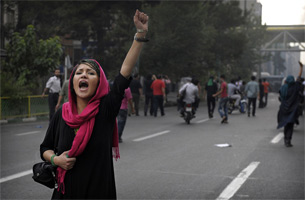 I have been doing my best to keep up with the ongoing events in Iran. I don't know enough to truly understand the nuances of the election or the political science behind it all, but like many others, I've been caught up in the human drama of it all. Photos like this one literally brought tears to me eyes.
I have been doing my best to keep up with the ongoing events in Iran. I don't know enough to truly understand the nuances of the election or the political science behind it all, but like many others, I've been caught up in the human drama of it all. Photos like this one literally brought tears to me eyes.
Knowing the plight of women in Iran, and hearing even limited stories in interviews or from the book Reading Lolita in Tehran, connected me on a visceral level with all that this picture symbolized. And those of us following the hundreds of tweets a second with the #iranelection tag can't help but be overwhelmed at the role social networking is playing in this revolution.
But that of course begs the question of the validity of using Twitter as news source. Just follow the hashtag for a few minutes and anyone can see that there is a lot of confusion about what is really happening. One person can say something and it gets re-tweeted hundreds of times regardless of whether or not it is true. And while we have all witnessed the ability of other open-source projects like Wikipedia to self-regulate, this Twitter revolution is too intense and caught up in the moment to do so well, if at all. So other media outlets are left trying to sort fact from fiction and have then found themselves attacked when they question some of the more emotional aspects of what is going on. Was there really election fraud? How many protesters are actually involved? Were the election results really leaked? For those caught up in the momentum of the moment, those questions challenge the very thing they are fighting for.
So in watching this unfold, I have to wonder how much truth does matter when it comes to something like revolution. If the truth is that Ahmadinejad won fair and square and that there was only a small group of protesters, does that truth matter if the lies that were spread end up being the catalyst that spark change on a massive scale? It seems to me that in situations like these, the details matter less than the cause. If the viral spread of information on Twitter -- albeit unsubstantiated, possible misinformation -- ends up pushing people beyond the tipping point in the fight for freedom, can we really call that information bad?
These are just the thoughts that run through my head as I watch this whole thing unfold. I don't know where it will lead, or if it is truly a revolution of any sort. But at the same time I can't help but wonder how differently other atrocities like the Tiananmen Square massacre or even the Holocaust would have gone if Twitter's passionate spread of information -- even before it could be verified -- had been around then. Would enough people knowing about them and getting angry have stopped them? Or, for that matter, why isn't there the same passion and endless Twitter campaigns for other freedom issues like human trafficking?
 Julie Clawson is the author of Everyday Justice: The Global Impact of Our Daily Choices
Julie Clawson is the author of Everyday Justice: The Global Impact of Our Daily Choices (IVP 2009). She blogs at julieclawson.com and emergingwomen.us.
Got something to say about what you're reading? We value your feedback!